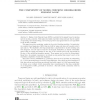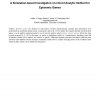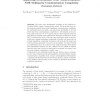287 search results - page 24 / 58 » Communication complexity as a lower bound for learning in ga... |
GECCO
2009
Springer
14 years 4 days ago
2009
Springer
We apply CMA-ES, an evolution strategy with covariance matrix adaptation, and TDL (Temporal Difference Learning) to reinforcement learning tasks. In both cases these algorithms se...
GECCO
2010
Springer
14 years 10 days ago
2010
Springer
The Spidergon interconnection network has become popular recently in multiprocessor systems on chips. To the best of our knowledge, algorithms for collective communications (CC) h...
LMCS
2007
13 years 7 months ago
2007
Higher-Order Fixpoint Logic (HFL) is a hybrid of the simply typed λ-calculus and the modal µ-calculus. This makes it a highly expressive temporal logic that is capable of express...
EDM
2010
13 years 9 months ago
2010
Epistemic games are designed to help players develop domain-specific expertise that characterizes how professionals in a particular domain reason, communicate, and act [1, 11]. To ...
ICALP
2007
Springer
14 years 1 months ago
2007
Springer
d Abstract) Paul Beame1, , Matei David2, , Toniann Pitassi2, , and Philipp Woelfel2,† 1 University of Washington 2 University of Toronto Abstract. We solve some fundamental probl...



